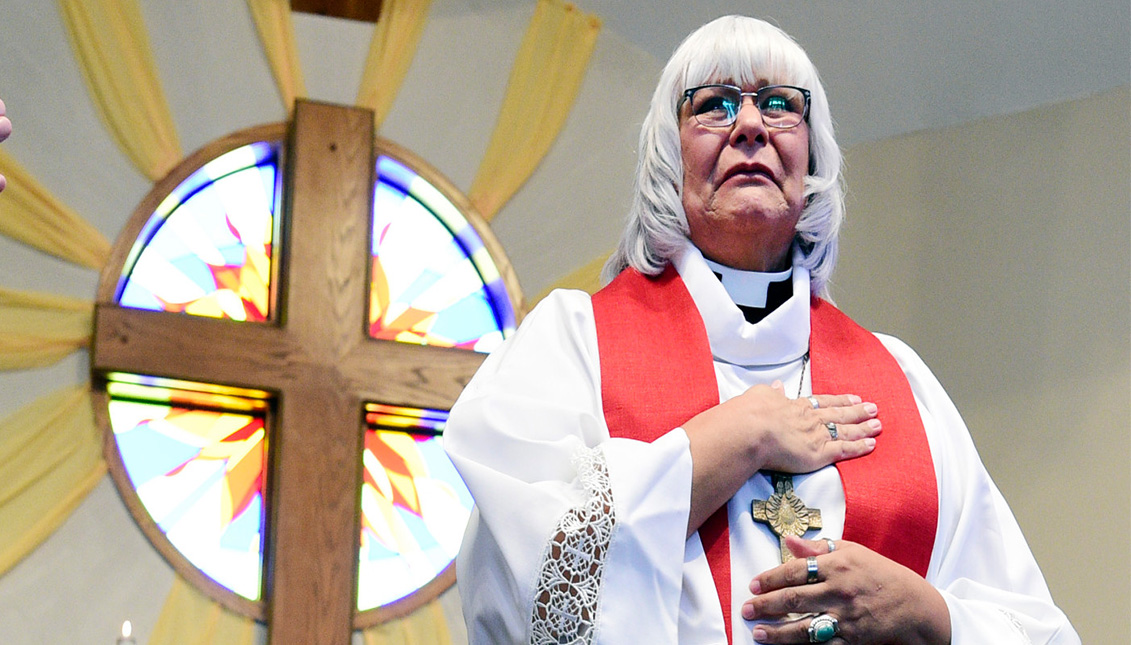
Meet the first Latino transgender person to become a Lutheran pastor in the United States
Since she was ordained last November, Nicole Garcia wants to inspire other LGBTQ+ people and people of color to follow their path through faith.
She grew up in Catholicism, but abandoned religion for 20 years before her prayers were heard. Now Nicole Garcia, 60, has a congregation of more than 100 faithful at Westview Lutheran Church in Boulder, Colorado.
"No one can question my faith, my devotion to Christ, my devotion to the Church. That's why I'm a pastor here," she said in an interview with NBC News. "Being a trans is secondary."
Just two weeks ago, Garcia, the first Latina transgender woman ordained pastor in a Lutheran church in the United States, gave her first sermon. Her struggle to see her dreams come true was long and not without obstacles; for 40 years, she says, she had trouble reaching the pulpit.
Born the "eldest son" of a devout Catholic family in Colorado, she was never comfortable with the role she was assigned or what was expected of her.
She played guitar in the church choir, went to mass two and three times on weekends, prayed with her grandmother in the kitchen kneeling on the floor with the blackened rosary she still keeps, but "I never felt comfortable in my own skin," she says.
As a teenager, she loved to dress in feminine clothes, and although she tried to behave like her male cousins did, after a few years of praying for discomfort to disappear, she quit the Church and fell into a spiral of drugs, parties, and alcohol that was, she says, the excuse to "crossdress" and date men.
"I realized that I have always been Nicole. I've always been a woman."
One day, while living in a cousin's trailer in Boulder trying to overcome her alcoholism, she realized she had to change her life, moved to a different city and met a woman in a karaoke. They got married a year later.
Then they moved to Denver, where she got a job as a penitentiary officer, but the feeling she had since she was a child was still there. That uniform was a "costume" for Nicole, and when she got home, exhausted, all she thought about was drinking. Her marriage ended after 8 years.
This is the pose from my keynote in San Diego I shall remember.
— Rev. Nicole M. Garcia (@nicoleg152) July 18, 2018
Photo by ©SLForsburg pic.twitter.com/XyS8QrS7Cv
Shortly after her divorce, she was sitting in the kitchen thinking that she had thrown her life away when she had a revelation: “I had my come-to-Jesus moment. It wasn’t one of those, 'Oh please, oh please, help me,’” she explained. “It was more, 'Alright you son of a b---h, if I’m going to come back, you better step it up this time.’”
RELATED CONTENT
This time the prayer was heard. Therapy sessions helped her reveal and assume her identity, and she contacted a gender identity center in Colorado.
"I realized I've always been Nicole. I've always been a woman. I knew I had to make the transition at that point," she says.
"No one can question my faith, my devotion to Christ, my devotion to the Church. That's why I'm a pastor here."
Decisions, often painful, open other doors. At the center, she met a police officer in transition who encouraged her to attend a service at St. Paul's Lutheran Church in Denver.
"I was convinced that I would come in and they would say, 'Look at that man in disguise,' but they didn't do it. I felt at home."
Eventually, she became a Lutheran and an activist for the acceptance of the LGBTQ+ community within her church, something she has been doing for more than 16 years. Despite the initial reluctance of those who knew her as the "eldest son," sad and unhappy with her body, and who prayed without getting any answer.
On Nov. 23, more than 200 people attended her ordination in Louiseville. Now she hopes to be an example for other LGBTQ+ people and people of color to take pride in embracing the faith.











LEAVE A COMMENT:
Join the discussion! Leave a comment.